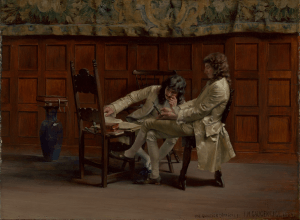Holly Case in Lapham’s Quarterly:
 In his book The Main Questions of Modern Culture from 1914, the German philosopher Emil Hammacher wrote about the questions of his time—among them the social, woman, and worker questions—their causes, and the longstanding desire to solve them and others, tracing their causes and solution-seeking back to Immanuel Kant and other eighteenth-century idealists. “Since people began to be surprised by that which was once considered self-evident, there have been questions and tasks whose solution is felt as a need and a necessity,” Hammacher wrote on the eve of the Great War. “Never before have there been so many riddles storming the people as there are today.”
In his book The Main Questions of Modern Culture from 1914, the German philosopher Emil Hammacher wrote about the questions of his time—among them the social, woman, and worker questions—their causes, and the longstanding desire to solve them and others, tracing their causes and solution-seeking back to Immanuel Kant and other eighteenth-century idealists. “Since people began to be surprised by that which was once considered self-evident, there have been questions and tasks whose solution is felt as a need and a necessity,” Hammacher wrote on the eve of the Great War. “Never before have there been so many riddles storming the people as there are today.”
Emil Hammacher did not survive the war. He was killed at the front in France, but The Main Questions of Modern Culture was celebrated by no less a figure than Thomas Mann, who in 1918 praised Hammacher as “the young philosopher from Bonn…whom I would very much like to call my posthumous friend” in his conservative defense of Germany’s involvement in the war, Reflections of a Nonpolitical Man. In spite of Mann’s posthumous blessing, Hammacher did not even attain that moderate amount of fame required to be included in the German Biographical Encyclopedia. But his thought was as steeped in the problem of action (What is to be done?) as the leftist György Lukács’, and constitutes a more accurate summation of what the age of questions had wrought: namely, doubt and despair, and a loss of faith in the Lösung (solution).
More here.
